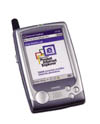Mobile Internet
|

Photo: Siemens (ITU 010515)
|
|

Photo: Siemens
(ITU 010541)
|
Accessing and using the Internet via a mobile communicator/phone or computer or via a television set-top box is
expected to become commonplace in the coming years, allowing the creation of new applications and services. Reasons for the rapid increase in address consumption include the expected increase in the number of mobile phone users who will want
to connect to the Internet and of “always-on connection” users who will want to use broadband access infrastructure such as DSL or ADSL and cable modems.
Wireless Internet, as provided by 3G mobile networks, is expected to lead the IPv6 revolution, though IPv6 will also
pervade further into the home, the workplace, into cars and into consumer electronic devices. “The large address space of IPv6 will clearly smooth progress of global connectivity for billions of users and devices while facilitating deployment of advanced 3G services,” Mr Blois told the IPv6 Task Force. He also commented that the requirements for deployment of advanced IMT–2000 and systems beyond, especially those based on core IP networks, would benefit greatly from the availability of IPv6.
|
Photo: Nokia (ITU
0100127) |
Photo: Alcatel (ITU 010520)
Today, some industry experts say that before the world can truly experience next generation communications such as IMT–2000 or third generation (3G) mobile services, it needs to adopt a new protocol known as IPv6
|
|

Photo: Ericsson (ITU 010537)
|
|
|
The implementation of IPv6 in mobile networks is expected to allow for wireless machine-to-machine interconnection,
and boost the plethora of 3G services which are expected to include: mobile Internet/intranet/extranet access and customized infotainment, consumer videophone and multimedia conferencing, location-based services, and business and consumer multimedia messaging services. While it is widely acknowledged that the transition to all-IPv6 networks will require several years of effort, some regions of the world consider that any delay towards such a transition could
well hinder the full introduction of next generation applications.
In Europe, for example: “the question of when to begin a migration path to IPv6 is an issue of paramount importance to
a wide range of industries, which will be producing goods with embedded Internet access, including cars and consumer electronics, as well as for fixed, mobile and wireless communications,” according to the report of the IPv6 Task Force.
In the context of 3G mobile communications, the European Commission issued a communication on 20 March 2001
(http://europa.eu.int/ISPO/infosoc/telecompolicy/en/com2001-141en.pdf) stressing that the current Internet Protocol (IPv4) could hinder the full deployment of 3G services in the long run. It further underlined the need for widespread adoption of the latest version of the Internet protocol before 2005 when existing IPv4 addressing is expected to run out of space. The European Union, which has acquired a position of leadership in the usage of mobile communications illustrated by its very high penetration levels (close to 73 per cent on average in January 2002), sees IPv6 as a prerequisite for 3G success.
Europe aims to accelerate the development of a high capacity, reliable and secure, communications infrastructure, with always-on connectivity and high wireless mobility.
In June 2000, the European Council endorsed the “eEurope 2002” Action Plan which defines the measures needed to accomplish the objective of “An Information Society for All”. It specifically addressed the next generation Internet, including mobile Internet, and emphasized the need for a vastly increased Internet IP address space.
“Our objective is to ensure that Europe’s competitiveness in wireless technology is not jeopardized by the lack
of a clear road map towards IPv6,” European Enterprise and Information Society Commissioner Erkki Liikanen said in his opening speech to the first meeting of the IPv6 Task Force in April 2001. “We have to look at other means to stimulate the emergence of Mobile Internet. We have to see that a new Internet Protocol — IPv6 — will be rolled out swiftly,” Mr Liikanen also declared.
|